AidPal

AidPal is a smart, AI-powered first aid assistant designed to guide users through emergency situations by providing instant, accurate, and easy-to-follow medical guidance. Whether someone is dealing with a burn, cut, bruise, sprain, or other common injury, AidPal empowers users to take the right steps before professional help arrives.
Users can simply upload or take a photo of the injury, and AidPal uses advanced image recognition to identify the type of wound. Once detected, the app delivers step-by-step first aid instructions based on globally trusted medical guidelines, including those from the Red Cross and World Health Organization.
If image recognition is unclear or unavailable, users can type in their symptoms or use the built-in chatbot to receive relevant help. The app also offers voice-guided instructions and, where applicable, 3D visual aids to make first aid even easier to follow.
AidPal also includes an emergency mode that enables users to quickly access and display instructions for critical situations. Designed for speed, clarity, and accessibility, AidPal transforms any phone or computer into a life-saving companion, bringing essential first aid knowledge to users anytime, anywhere.
Sri Āyu: AI-Powered Ayurvedic Wellness
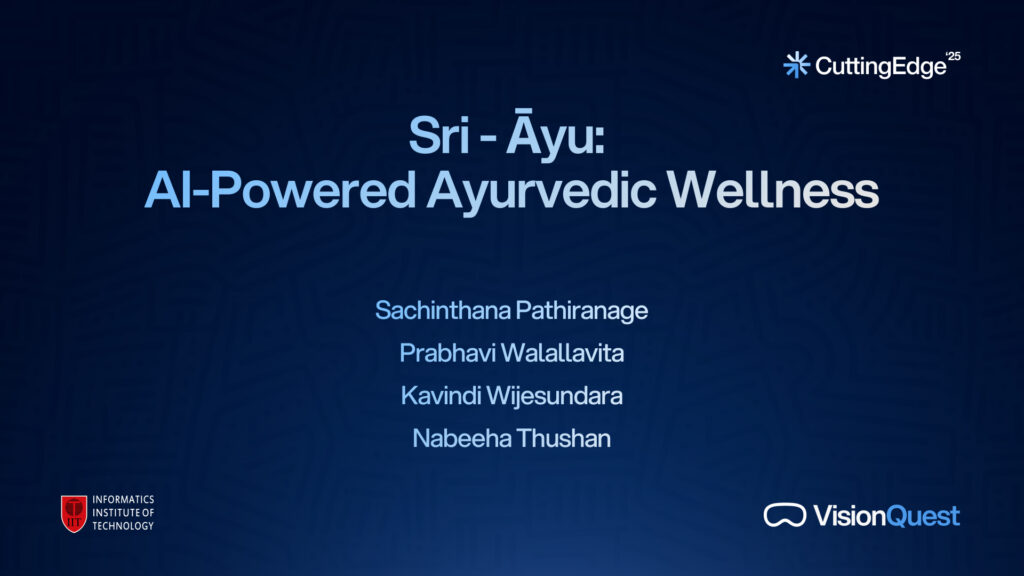
Sri Āyu is an innovative AI-powered platform that integrates traditional Ayurvedic knowledge with modern data science to revolutionize holistic healthcare and wellness tourism in Sri Lanka. Ayurveda, while deeply rooted in culture and offering personalized care, often faces challenges in mainstream acceptance due to its reliance on subjective diagnostics and limited data validation. Sri Āyu addresses these gaps by introducing a unified, intelligent system that automates key Ayurvedic functions and delivers data-driven insights.
The platform comprises four main components: Dosha Classification, Disease Prediction with Personalized Treatment Recommendation, Treatment Outcome Prediction, and Ayurvedic Tourism Forecasting. Using machine learning models such as Logistic Regression, Random Forest, SVM, and XGBoost, it analyzes user inputs like body characteristics, symptoms, and demographics to accurately determine Dosha types, suggest tailored wellness plans, and predict treatment success rates along with expected recovery timelines. Additionally, it leverages time-series analysis to forecast tourism trends, supporting strategic decision-making for the wellness tourism sector.
Sri Āyu features a user-friendly web interface that connects patients, practitioners, and stakeholders in a seamless experience. It empowers Ayurvedic clinics, wellness seekers, and tourism boards with tools for evidence-based care and strategic planning. The project not only enhances the credibility and scalability of Ayurveda through technology but also promotes Sri Lanka as a global destination for holistic wellness. With potential expansion into telemedicine, wearable integration, and multilingual support, Sri Āyu sets a foundation for the future of AI-integrated traditional medicine.
MIMO – A Gamification-Based Multi-Modal Approach to Enhance Cognitive Stimulation and Emotional Awareness in Children with Down Syndrome
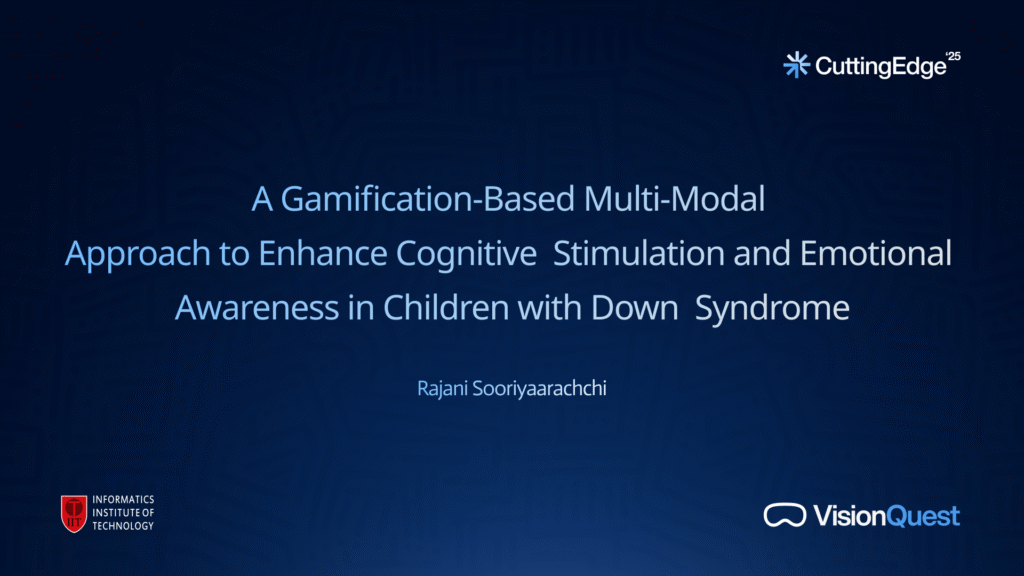
“Children with Down syndrome often face challenges in their emotional and cognitive development, impacting areas like social skills, memory, attention, and spatial awareness. While previous research has explored gamification and AI in clinical settings, there’s a clear need for direct intervention through specific, cohesively designed assistive learning applications that address these unique cognitive and emotional needs.
A Novel Gamification-Based Approach
This research proposes a novel gamification-based multimodal approach leveraging modern deep-learning techniques to bridge this gap. The goal is to create a single, comprehensive assistive application that integrates three crucial capabilities:
Interactive Storytelling Module: This module allows children to engage with various awareness scenarios, receiving dynamic feedback generated by OpenAI’s GPT-4 model. Their progress is systematically documented, providing valuable insights for educators.
Facial Emotion Recognition System: This system uses a Fractal Neural Network enhanced by a secondary HDC classifier and optimized through a Genetic Algorithm. To ensure transparency, Explainable AI (XAI), specifically Grad-CAM, is incorporated to visualize the system’s decision-making process.
Speech Emotion Recognition System: Built on a hybrid feature set, this system combines traditional audio features (such as Chroma, Mel Spectrogram, and Spectroid) with advanced descriptors like Topological Data Analysis, Spectral Flux, Glottal Dynamics, and Teo with auto envelope features. The model design utilizes Ordinary Differential Equations (ODE), Bidirectional Gated Recurrent Units (BiGRU), and Attention methods to enhance emotional categorization accuracy.
Accuracy and Future Directions
The proposed study demonstrated a multimodal accuracy of 81% for emotion recognition and 51% for spoken emotion recognition. It’s important to note that the research acknowledges limitations in generalizing datasets for each modality, which influenced the achieved accuracy levels. This opens up a promising avenue for open research to further enhance the accuracy and robustness of these assistive learning applications for children with Down syndrome.”
TremorAid. An Intelligent Parkinson’s Companion: Tracking, Predicting and Personalizing care
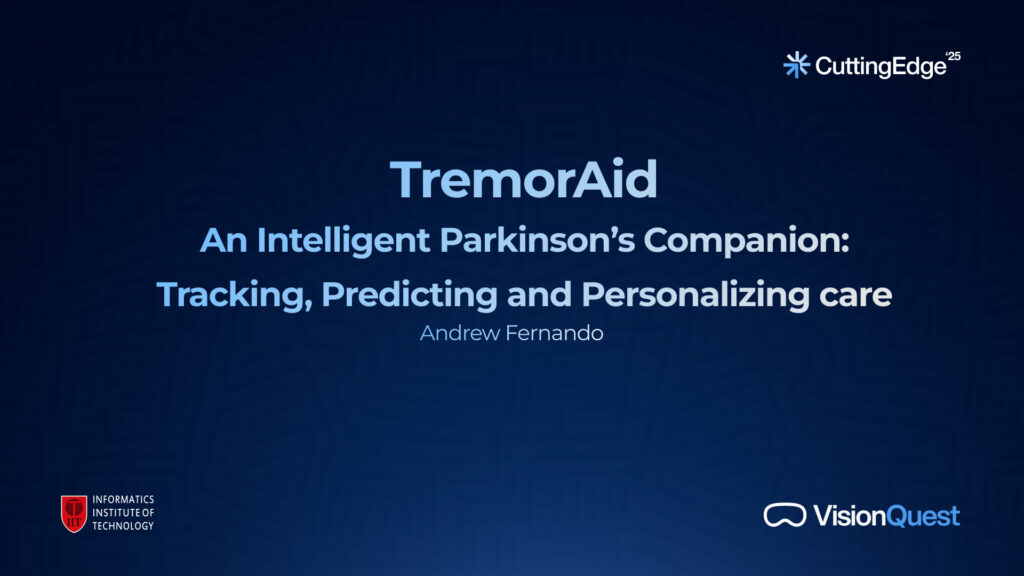
“Parkinson’s disease (PD) is a progressive neurodegenerative disorder affecting over 10 million people globally, including approximately 92,000 in Sri Lanka. Characterised by symptoms such as tremors, rigidity, and bradykinesia, PD requires early detection and continuous monitoring to enhance patient outcomes. Traditional symptom-tracking methods like paper diaries or generic digital tools often lack consistency, accessibility, and suitability for those with motor impairments.
TremorAid is a mobile-based application designed to bridge these gaps by enabling PD patients to log symptoms, track tremor progression, and identify environmental triggers. With an intuitive interface tailored to users with motor difficulties, TremorAid promotes autonomy through seamless symptom logging, access to educational resources, and meaningful, data-driven insights.
Leveraging artificial intelligence, the app classifies tremors, visualises symptom trends, and provides personalised symptom trajectories for proactive disease management. A key feature is its future symptom analysis module, which forecasts progression based on historical patient data, empowering users and healthcare professionals to make informed decisions about care and treatment adjustments.
While TremorAid does not support direct communication with healthcare providers, it enables data sharing via visual dashboards that support clinical evaluations. Future iterations may include wearable device integration and improved predictive models for enhanced monitoring and insight.
TremorAid exemplifies how digital health innovations can address the challenges of chronic disease management. By combining AI-driven insights, accessibility, and a patient-centric approach, it contributes meaningfully to advancing personalised care in Parkinson’s disease.”
ImmersiveSmilePlus: Personalised Pain Management Model with Tactile Feedback in Virtual Reality Exposure Therapy
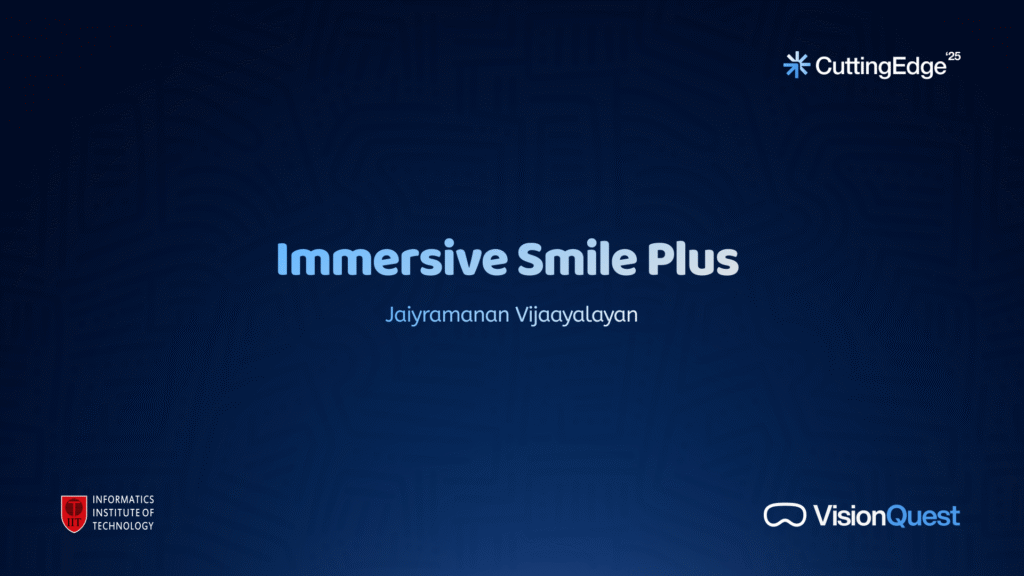
This study introduces an advanced interactive virtual reality exposure therapy (VRET) system tailored for pediatric pain management, motivated by initial trials that revealed the limitations of VR alone in adult pain relief during cystoscopy and the promising results when combined with physical interaction in paediatric patients. Traditional VRET systems lack real-time adaptive feedback and tactile integration, which this system addresses by incorporating a sensor-enabled stress ball with a force-sensitive resistor (FSR) sensor. This sensor captures tactile feedback such as grip force, squeeze frequency, and duration, transmitting the data wirelessly to a Virtual Reality Therapy application.
Initial trials conducted at the Asiri Central Hospital, Sri Lanka demonstrated that while VR
alone was insufficient for adult pain management, with patients reporting high pain scores (7–9/10) during cystoscopy procedure. And during a trial conducted with the admitted Dengue patients at Royal Hospital, Sri Lanka, the combining VR with physical interaction significantly reduced pain scores in paediatric patients (1–5/10) and enhanced their engagement. These findings shifted the focus towards developing an interactive VR therapy specifically for children, integrating tactile feedback for a more immersive and responsive experience.
Oculus Nova
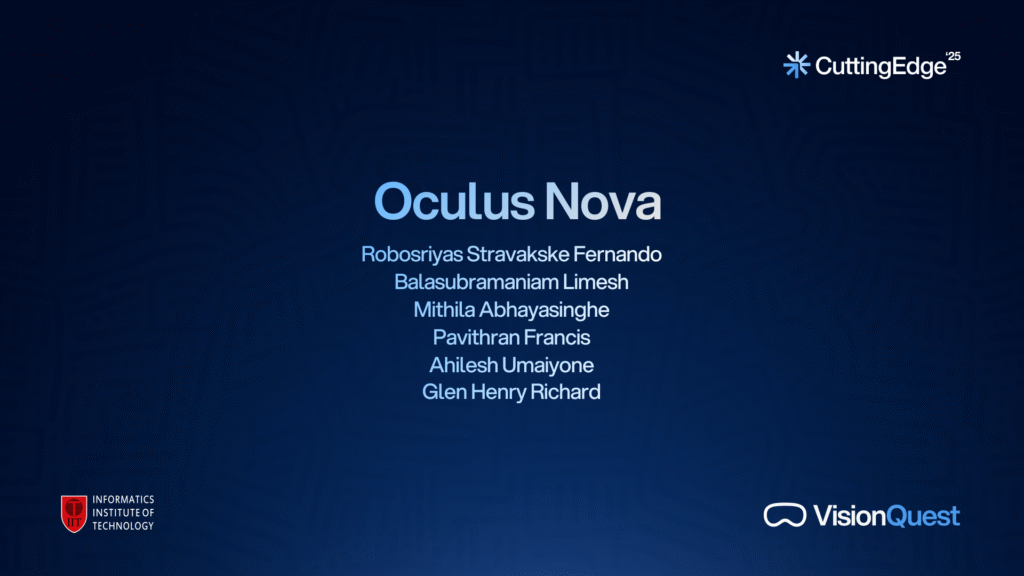
Oculus Nova addresses the challenges in treating amblyopia, especially in children, where traditional methods like eyepatching and atropine drops often lead to low compliance due to discomfort, lack of engagement, and social stigma. This gamified vision therapy application aims to make treatment more interactive, enjoyable, and effective. Oculus Nova incorporates two distinct therapeutic approaches. The first encourages the use of an eye patch through a reward-based game system that detects whether the patch is worn—only granting access or in-game boosts if therapy compliance is met. The second approach utilizes red-blue 3D glasses to deliver layered visual stimuli: the amblyopic eye (red lens) perceives clearer game visuals while the stronger eye (blue lens) sees blurred content. This approach mimics occlusion therapy in a less intrusive, more engaging way.
To further improve therapy outcomes, Oculus Nova includes a progress tracker that logs user performance and logMAR readings, providing valuable insights for therapists and guardians to make data-driven decisions. The application also incorporates screen time monitoring based on the 20/20/20 rule—20-minute sessions, up to three times daily—to promote healthy visual habits and reduce digital eye strain. Using eye-tracking technology and gamified elements, Oculus Nova redefines vision therapy by enhancing motivation, engagement, and consistency. Ultimately, the project aims to improve vision outcomes while offering a more positive therapeutic journey for young users.
ShiftSL
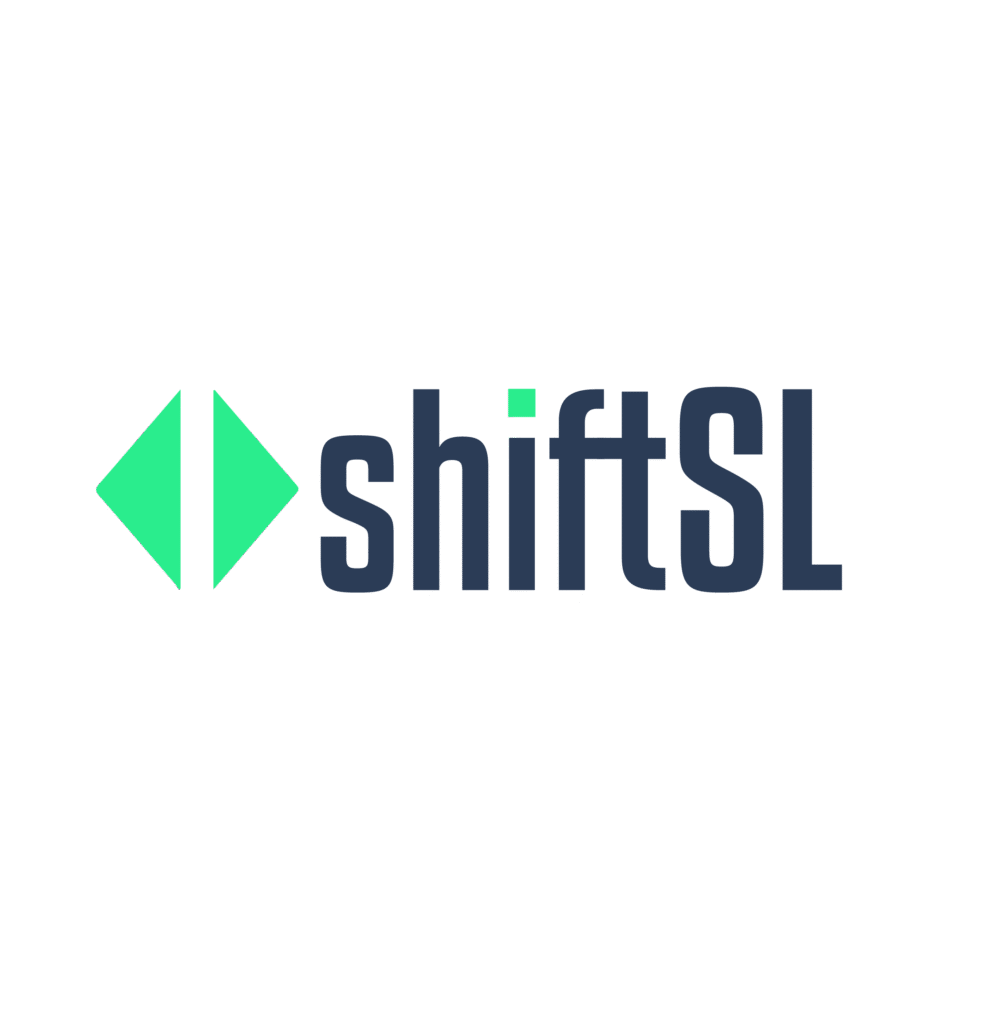
ShiftSL is a dynamic scheduling system designed to address the critical inefficiencies in roster and leave management within Sri Lanka’s healthcare sector. It provides a web dashboard for Ward Administrators and a mobile app for healthcare staff, streamlining communication, roster generation, and shift management.
Currently, hospitals rely on outdated methods such as Excel sheets and WhatsApp groups to assign shifts and handle last-minute replacements. This process is not only error-prone but also places a massive burden on administrators, who must manually coordinate with staff to fill in gaps. It also contributes to staff burnout, as doctors and nurses are often required to find their own replacements or cover additional shifts due to poor coordination.
ShiftSL solves this by allowing staff to update their availability and shift preferences through a user-friendly mobile app. Administrators can then automatically generate optimized rosters through the dashboard. The system also includes a smart leave management feature that sends notifications when a shift becomes available, assigns replacements based on suitability, and even splits shifts if no full replacement is found.
Beyond healthcare, ShiftSL can be extended to other service-based industries such as hotels, ports, and airports, where shift-based work is essential and manual scheduling leads to similar issues. By digitizing the scheduling process, ShiftSL improves operational efficiency, reduces administrative stress, and enhances employee well-being—making it a vital tool across multiple industries.
AI-Powered Smart Pregnancy Belly Wrap for Continuous Maternal & Fetal Monitoring
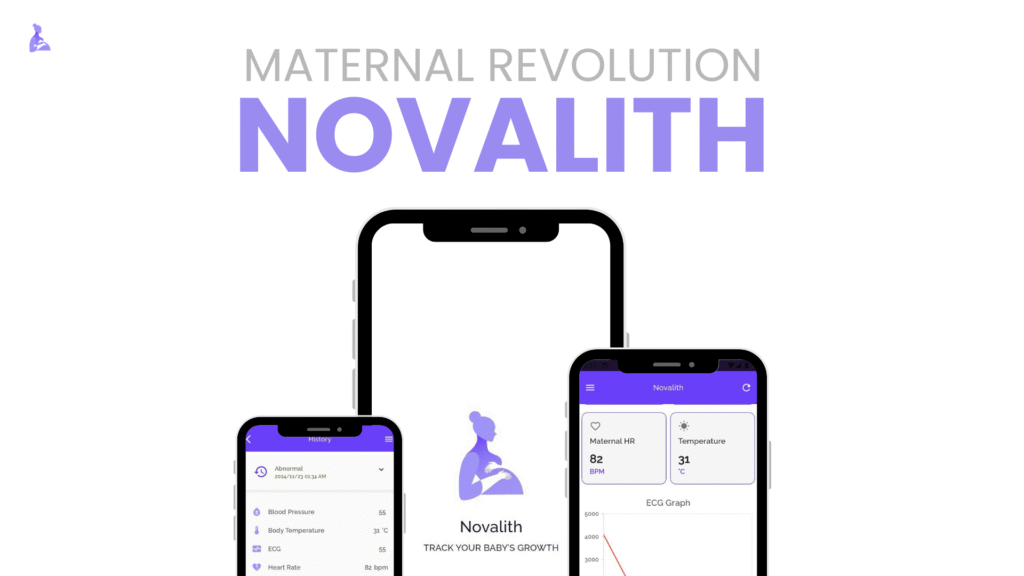
NOVALITH® is a next-generation smart pregnancy monitoring solution designed to bridge the critical gaps in maternal healthcare through a non-invasive, wearable belly wrap. Developed with a strong focus on comfort, clinical accuracy, and technological scalability, NOVALITH enables continuous, real-time tracking of vital maternal and fetal health metrics such as heart rate, temperature, and fetal movement, using a series of discreet, medical-grade sensors embedded within a soft, breathable smart textile.
The wrap connects via Bluetooth Low Energy (BLE) to a mobile application, which displays live biometric data through a user-friendly interface. Using machine learning algorithms, the app analyzes incoming data to detect early signs of high-risk complications like preeclampsia, gestational diabetes, or fetal distress. In the event of an anomaly, instant alerts are sent to both the mother and her healthcare provider via a secure cloud-based platform.
The solution is especially impactful in regions with limited access to regular checkups, where early detection can save lives. NOVALITH also includes a clinician dashboard, allowing remote access to patient data, trend analysis, and documentation to support clinical decisions.
Designed with minimalism and elegance in mind, NOVALITH features a subtle battery indicator and a sleek, soft-pink finish to ensure comfort and dignity during wear. Backed by a subscription-based revenue model, it ensures affordability while supporting long-term innovation.
NOVALITH doesn’t just monitor pregnancies, it transforms them into safer, smarter experiences by empowering mothers and modernizing prenatal care through scalable, data-driven intelligence.
Babble
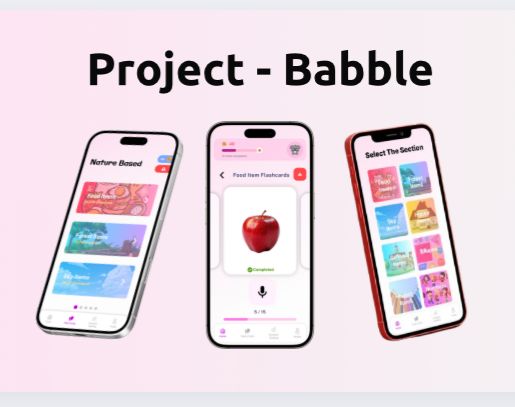
Children with communication disorders, such as ADHD, autism spectrum disorder, cerebral palsy, aphasia, apraxia, Down syndrome, and speech delay, generally face many problems in articulating their thoughts and needs. This forms a barrier to communication that may lead to frustration, isolation, and hindrance in social development. These cases affect the interaction of a child, the learning process, and social relationships. An app called “Babble” will be developed to improve communication skills and livelihoods for kids in such conditions.
“Babble” aims to help children with communication disorders develop their communication skills and provide support for carers and educators. Some of its features include interactive flashcards, scenario-based sentence formation activities, and emergency access cards for helping children build up basic communication competencies in a fun yet supportive way.
“Babble” will offer tailored and flexible resources, equipping children to overcome different communication difficulties helping them express themselves and communicate with others. By equipping caregivers and educators with tools to track progress and adapt the app’s content to each child’s needs, “Babble” has the potential to significantly impact the social and emotional well-being of children with communication disorders.
Resilify
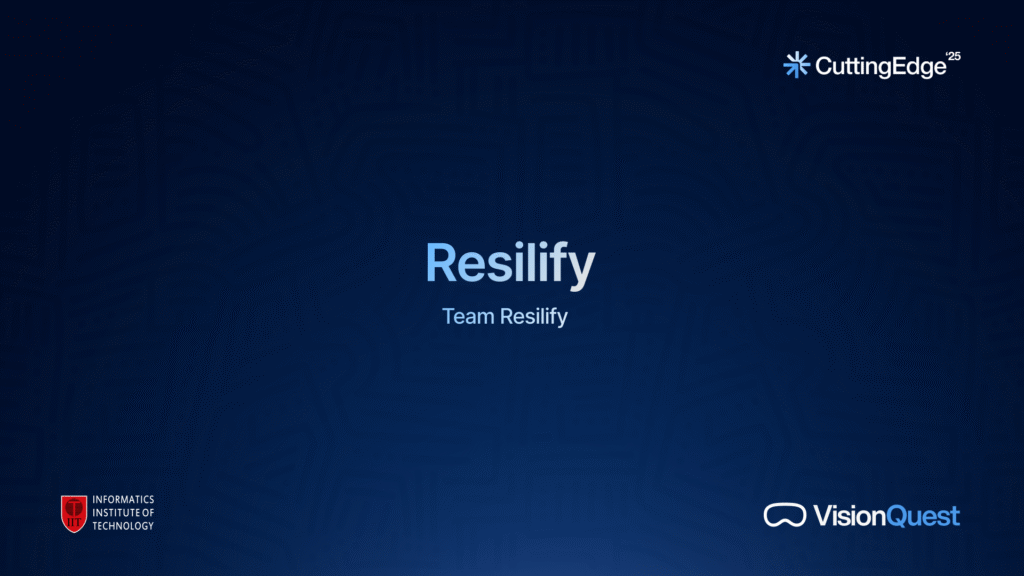
Obsessive-Compulsive Disorder (OCD) affects over 80 million people globally, with intrusive thoughts impacting more than 90% of patients—and even up to 94% of the general population at some point. Despite the effectiveness of treatments like Cognitive Behavioral Therapy (CBT) and Exposure and Response Prevention (ERP), dropout rates remain alarmingly high. Many individuals face emotional overwhelm, stigma, and a lack of engaging tools to support them outside therapy sessions. The result is a significant gap between clinical treatment and real-world recovery.
Resilify is an AI-powered mobile platform designed to bridge this gap. Combining clinically validated OCD management techniques with gamification, personalization, and AI-driven features, Resilify transforms recovery into a daily, accessible, and empowering experience. Key features include cognitive reframing tools, interactive ERP tasks, guided mindfulness, and personalized progress tracking. Its unique Thrive & Grow section offers myth-busting articles, rewards, and success stories to boost engagement.
Resilify’s upcoming features expand support further: compulsion-tracking tools, a global therapist marketplace, voice input, and immersive AR/VR therapy. The app is scalable across mobile-first markets and underserved regions. Built by a passionate team of undergraduates in collaboration with mental health professionals, Resilify is not just a product—it’s a movement to make consistent, compassionate, and cutting-edge mental health support universally accessible.
